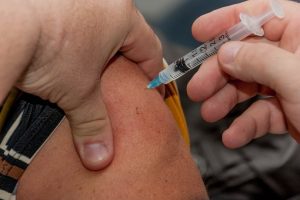
The vaccine usually takes about two weeks after the shot to become effective, so doctors say there’s no reason to wait to get one.
Dr. Susan Rehm discusses a common flu shot myth: No, flu vaccines cannot cause flu illness. Flu vaccines given with a needle (i.e., flu shots) are currently made in two ways: the vaccine is made either with a) flu viruses that have been ‘inactivated’ (killed) and that therefore are not infectious, or b) using only a single gene from a flu virus (as opposed to the full virus) in order to produce an immune response without causing infection. This is the case for recombinant influenza vaccines.
There are several reasons why someone might get flu symptoms, even after they have been vaccinated against flu. One reason is that some people can become ill from other respiratory viruses besides flu such as rhinoviruses, which are associated with the common cold, cause symptoms similar to flu, and also spread and cause illness during the flu season. The flu vaccine only protects against influenza, not other illnesses. They say that most people coincidentally experience an upper respiratory infection within weeks of receiving a flu shot.
Experts warn if a pandemic flu were to break out, the U.S. would not be prepared for it. Australia recently experienced one of the worst flu seasons in recent years, and the Southern Hemisphere is usually a good indicator of what will happen in the Northern Hemisphere.



